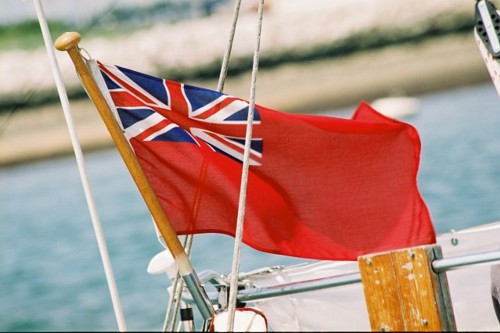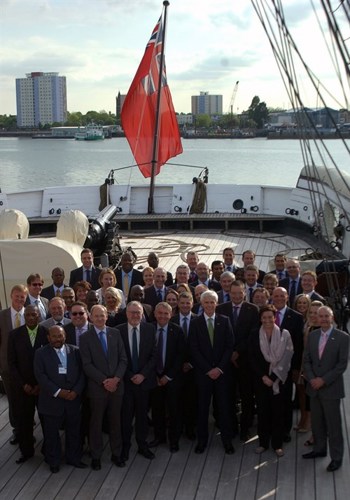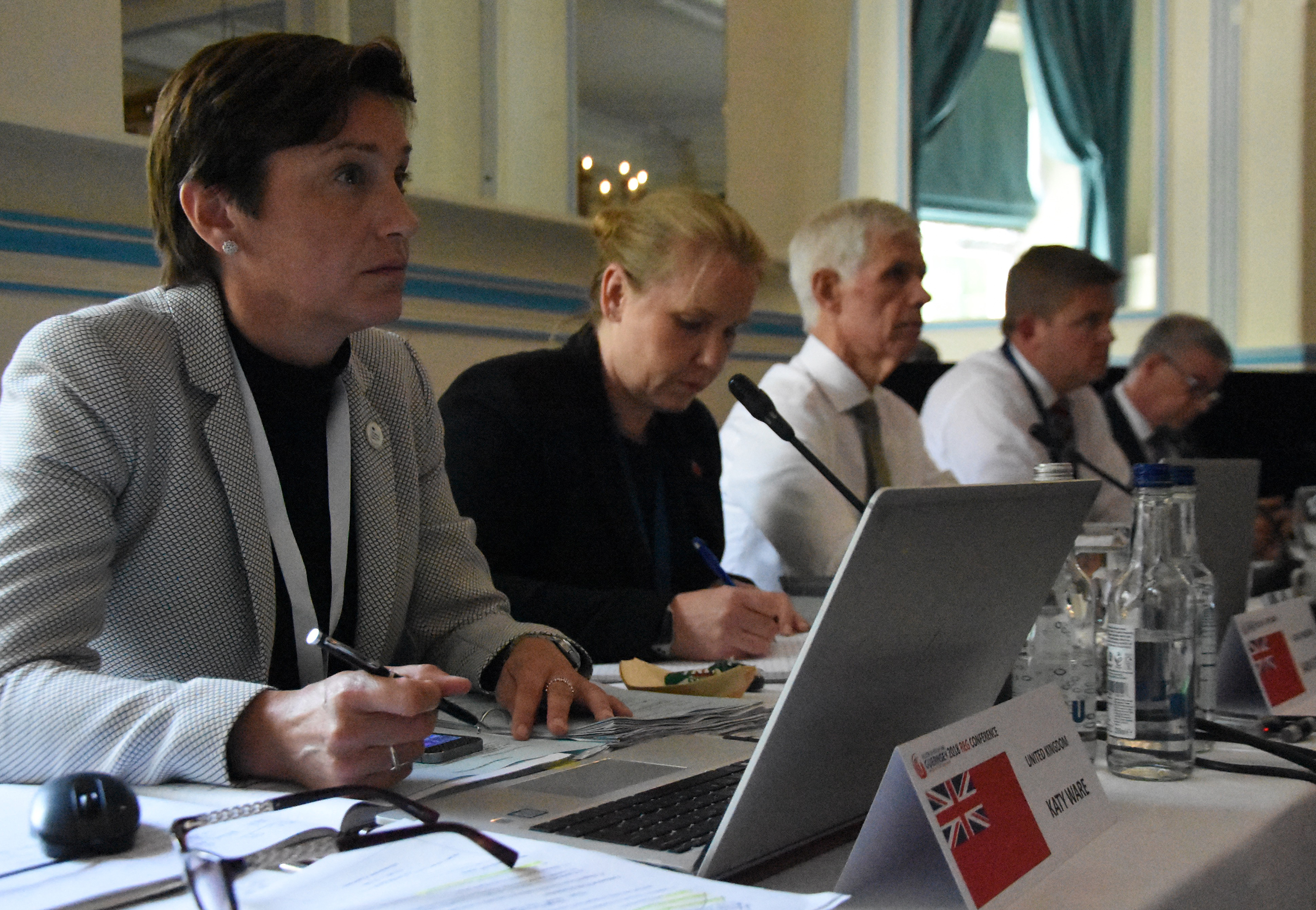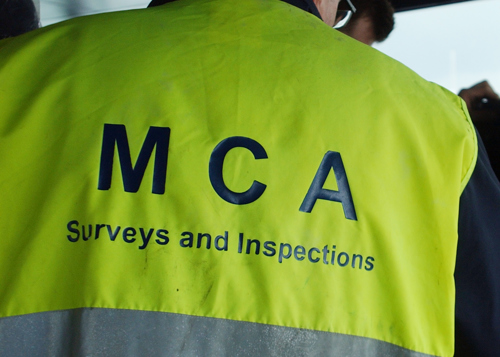

 The Red Ensign (or "Red Duster" as it is occasionally known) is a flag that originated in the early 17th century as a British ensign flown by the Royal Navy and was later adopted specifically by British merchantmen to be flown as the civil ensign of the British merchant fleet.
The Red Ensign (or "Red Duster" as it is occasionally known) is a flag that originated in the early 17th century as a British ensign flown by the Royal Navy and was later adopted specifically by British merchantmen to be flown as the civil ensign of the British merchant fleet.

Any vessel registered in the UK, a Crown Dependency (CD) or an Overseas Territory (OT), is defined as a British ship and is allowed to fly the British Merchant Shipping flag the 'Red Ensign.’
Additionally, section 3(b) of the UK Merchant Shipping Act 1995 allows the use of both the Red Ensign flag or a version of it defaced with the appropriate national colour, on vessels registered with a Crown Dependency or UK Overseas Territory provided they have either a Royal Warrant or an Order in Council.
The Red Ensign Group (REG) is made up of the international shipping registries operated by the United Kingdom, three Crown Dependencies (Isle of Man, Guernsey and Jersey) and nine UK Overseas Territories (Anguilla, Bermuda, British Virgin Islands, Cayman Islands, Falkland Islands, Gibraltar, Montserrat, St Helena and the Turks & Caicos Islands). These collectively form the British Register.

Category 1 administrations operate large international registers and may register ships of unlimited tonnage, type and length. Category 2 administrations can register commercial ships and pleasure vessels of up to 150 gross tons (GT). This limit can be extended to 400 GT with an agreement in place with the UK.
The Merchant Shipping (Categorisation of Registries of Relevant British Possessions) Order 2003 (SI 2003/1248, as amended by SI 2008/1243 and SI 2013/1115), establishes the categories of shipping registers.
The Red Ensign Group of ship registers has long been associated with quality within the maritime sector, and remains the flag of choice for many owners seeking high standards to ensure the safe running of their ships. Through this website you find information about the Group and individual links to the member's websites which will provide details on the benefits and advantages of British registration.
If you have specific questions on standards to be applied to your vessel, these can be found through the individual member's website or answered by the individual REG registry.
Individual REG members are responsible for setting their own registration fees, and this can be either found through the member's individual website or through contacting the local registry. Contact details are available on each member's page.
This depends on the requirements of the individual Red Ensign registry with which your vessel is registered, and updated advice should be sought directly from the registrar.
For information, section 3(b) of the UK Merchant Shipping Act 1995 allows the use of both the Red Ensign flag or a version of it defaced with the appropriate national colour, on vessels registered with a Crown Dependency or UK Overseas Territory provided they have either a Royal Warrant or an Order in Council:
(3) The following are also proper national colours, that is to say -
(b) in the case of British ships registered in a relevant British possession, any colours consisting of the red ensign defaced or modified whose adoption for ships registered in that possession is authorised by Her Majesty by Order in Council.
Under the United Nations Convention on the Law of the Sea (UNCLOS) and under international law, all ships registered within the Crown Dependencies and UK Overseas Territories are British Ships. In exercise of its powers, the United Kingdom as the Flag State under international law for these ships has devolved to the Crown Dependencies and UK Overseas Territories:
(a) the authority and power to deal with all IMO flag-state matters; and
(b) the implementation of the duties, obligations and responsibilities of a flag state under international conventions that have been extended to individual Crown Dependencies and UK Overseas Territories, relating to the performance and safety of ships registered within these administrations, including Port State Control. These functions are devolved within the structure of the government of the flag-state.
All Statutory Certificates for British ships registered within the Crown Dependencies and UK Overseas Territorities, including endorsements relating to seafarers' certification, issued by CDs or UK OTs are therefore issued under the responsibility of the UK.
Under the Merchant Shipping (Categorisation of Registries of Relevant British Possessions) Order 2003, the ship registers of Bermuda, British Virgin Islands, Cayman Islands, Gibraltar and the Isle of Man have been given Category 1 status, permitting them to register international trading fleets unlimited tonnage, type and length, because the UK's ratification of certain international conventions has been extended to these jurisdictions. In each case, the UK is the State Party to these conventions and remains ultimately responsible as a matter of international law for the discharge of treaty obligations by relevant REG members.
The same Order makes provision for Category 2 registers for Anguilla, Falkland Islands, Guernsey, Jersey, Montserrat, St Helena and the Turks and Caicos Islands to operate a Category 2 register. It prevents the registration of passenger ships or of other ships of more than 150 tons. However, there is an exemption which allows the registration of vessels between 150 and 400 tons and ships of special local importance, provided that arrangements are in force for such ships to be surveyed and inspected by reference to the standards set out in UK safety and pollution regulations.
Both Category 1 and Category 2 shipping registers operate with significant autonomy. Each register is responsible for the registration and adherence to international safety and environmental standards of their individual fleets.
The MCA has a dual role, in that as well as operating the UK Shipping Register, they have delegated authority from the UK Secretary of State for Transport to ensure that the REG British registries maintain the highest international maritime standards in accordance with their obligations under the International Conventions and in accordance with UK policy. This is carried out through their Business Improvement & Assurance branch who as well as monitoring performance of the registries, act as secretariat for the group and organise the annual REG Conference and associated meetings and working groups.

There has been support for the work of the REG for a number of years now as part of a Government commitment to partnering with the Overseas Territories and the Crown Dependencies. The Secretary of State for Transport has ultimate responsibility for the safety of all British shipping and has a duty to ensure that the standards maintained by the shipping registers in the OTs and CDs are, where appropriate, equivalent to those of the UK register. This relationship is set out in individual Memorandum of Understandings (MoUs) between the UK and the Government of the OT/CD in respect of the register of shipping. The REG registers are required to comply with the UK's international obligations and the general intention is that these should not exceed the requirements of International Conventions.
The MCA has delegated authority from the UK Secretary of State for Transport to put the technical and quality standards into effect. This role is fulfilled through a number of different aspects of the work which includes maintaining the integrity of both the Category 1 and 2 Registries through a four yearly cycle of visits. The scope of these visits covers all delegated functions under the agreement of the MoUs (including the quality standards, systems and procedures for registration, seafarer standards, accident investigation, survey and certification).


As the Flag State and signatory to the International Conventions, the UK is responsible for representing the interests of the REG in international forum such as the International Maritime Organization (IMO) and the International Labour Organization (ILO).
As well as this, there is Government support through providing expertise for such things as accident investigation, counter pollution work, coordinating emergency response and advice on sanctions, diplomatic or Port State Control intervention where REG vessels may be unnecessarily detained.
The UK Government also has a Conflict Stability and Security Fund. Funds have been made available to the Maritime & Coastguard Agency who, together with the UK Hydrographic Office have then been able to offer additional direct support and training to the UK Overseas Territories. This support includes legislative drafting assistance, operational training, assistance with implementing coastal State obligations. It also includes in-depth reviews and capacity building for search and rescue and also pollution response.


Each individual administration / register of the REG has its own application process for the issue of a Flag State Endorsement (FSE), and there are some differences in the acceptance of Certificate of Competencies (CoC) issuing countries. A combined list of countries which the UK has signed Memorandum of Understanding (MOU) on behalf of the Red Ensign Group (REG) Category 1 Registers can be located at the following link: https://www.gov.uk/guidance/list-of-countries-accepted-towards-issuing-a-reg-fse
Please note that each REG member has its own list of accepted countries as part of its application process for the issue of a FSE. Therefore, please use the individual links to REG member’s websites to find further information on accepted countries. This information is not held by the REG Secretariat.
